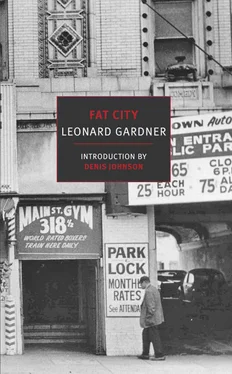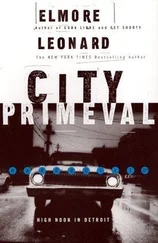Leonard Gardner - Fat City
Здесь есть возможность читать онлайн «Leonard Gardner - Fat City» весь текст электронной книги совершенно бесплатно (целиком полную версию без сокращений). В некоторых случаях можно слушать аудио, скачать через торрент в формате fb2 и присутствует краткое содержание. Год выпуска: 2015, Издательство: NYRB Classics, Жанр: Современная проза, на английском языке. Описание произведения, (предисловие) а так же отзывы посетителей доступны на портале библиотеки ЛибКат.
- Название:Fat City
- Автор:
- Издательство:NYRB Classics
- Жанр:
- Год:2015
- ISBN:нет данных
- Рейтинг книги:5 / 5. Голосов: 1
-
Избранное:Добавить в избранное
- Отзывы:
-
Ваша оценка:
- 100
- 1
- 2
- 3
- 4
- 5
Fat City: краткое содержание, описание и аннотация
Предлагаем к чтению аннотацию, описание, краткое содержание или предисловие (зависит от того, что написал сам автор книги «Fat City»). Если вы не нашли необходимую информацию о книге — напишите в комментариях, мы постараемся отыскать её.
Fat City — читать онлайн бесплатно полную книгу (весь текст) целиком
Ниже представлен текст книги, разбитый по страницам. Система сохранения места последней прочитанной страницы, позволяет с удобством читать онлайн бесплатно книгу «Fat City», без необходимости каждый раз заново искать на чём Вы остановились. Поставьте закладку, и сможете в любой момент перейти на страницу, на которой закончили чтение.
Интервал:
Закладка:
9
Hundreds of men were on the lamplit street, lined for blocks with labor buses, when Billy Tully arrived, still drunk. He had been up most of the night, as he had nearly every other night since the loss of his cook’s job; and he had been fired because of absences following nights out drinking. It had been agony getting up after three hours’ sleep. After the night clerk’s pounding, Tully had remained motionless, shaken, hearing the knocking at other doors, the same hoarse embittered summons down the hall. It had been so demoralizing that he had taken his bottle out with him under the morning stars. In the other pocket of his gray zipper jacket were two sandwiches in butcher paper. He had eaten no breakfast.
The wine calmed his shivering as he passed the dilapidated buses, the hats and sombreros and caps of the men inside silhouetted in the windows. The drivers stood by the doors addressing the crowds.
“Lettuce thinners! Two more men and we’re leaving.”
“Onion toppers, over here, let’s go.”
“Cherries! First picking.”
“They ripe?”
“Sure they’re ripe.”
“How much you paying?”
“A man can make fifteen, twenty dollars a day if he wants to work.”
“Shit, who you kidding?”
“Pea pickers!”
The sky was still black. Only a few lights were on in the windows of the hotels, dim bulbs illuminating tattered shades and curtains, red fire-escape globes. Under the streetlights the figures in ragged overalls, army fatigues, khakis and suit coats all had a somber uniformity. They pushed to board certain buses that quickly filled and rolled away, grinding and backfiring, and in these crowds Billy Tully jostled and elbowed, asking where the buses were going and sometimes getting no answer. He crossed the street, which was crossed continuously by the men and the few women and by trotting preoccupied dogs, and stopped at a half-filled sky-blue bus with dented fenders and a fat young man in jeans at the door.
“Onions. Ever topped before?”
“Sure.”
“When was that?”
“Last year.”
“Get on.”
Tully climbed into the dark shell, his shoes contacting bottles and papers, and waited amid the slumped forms while the driver recruited outside. “If these onions were any good,” Tully said, “looks like he could get him a busload.”
“They better than that damn short-handle hoe.”
“Maybe I ought to go pick cherries.”
“You make more topping onions, if we can get this man moving.”
The stars paled, the sky turned a deep clear blue. Trucks and buses lurched away. The crowd outside thinned and separated into groups.
“Let’s get going, fat boy,” Tully yelled.
“Driver, come on . I got in this bus to top onions and I want to top onions. I’m an onion-topping fool.”
The bus rattled past dark houses, gas stations, neonlit motels, and the high vague smokestack of the American Can Company, past the drive-in movie, its great screen white and iridescent in the approaching dawn, across an unseen creek beneath ponderous oaks, past the cars and trailers and pickup-truck caravans of the gypsy camp on its bank and out between the wide fields. Near a red-and-white-checkered Purina Chows billboard, it turned off the highway. Down a dirt road it bumped to a barn, and the crew had left the bus and taken bottomless buckets from a pickup truck when the grower appeared and told them they were in the wrong man’s onion field. The buckets clattered back into the truckbed, the crew returned to the bus, and the driver, one sideburn hacked unevenly and a bloodstained scrap of toilet paper pasted to his cheek, drove back to the highway swearing defensively while the crew cursed him among themselves. The sky bleached to an almost colorless lavender, except for an orange glow above the distant mountains. As the blazing curve of the sun appeared, lighting the faces of the men jolting in the bus — Negro paired with Negro, white with white, Mexican with Mexican and Filipino beside Filipino — Billy Tully took the last sweet swallow of Thunderbird, and his bottle in its slim bag rolled banging under the seats.
They arrived at a field where the day’s harvesting had already begun, and embracing an armload of sacks, Tully ran with the others for the nearest rows, stumbling over the plowed ground, knocking his bucket with a knee in the bright onion-scented morning. At the row next to the one he claimed knelt a tall Negro, his face covered with thin scars, his knife flashing among the profusion of plowed-up onions. With fierce gasps, Tully removed his jacket and jerked a sack around his bottomless bucket. He squatted, picked up an onion, severed the top and tossed the onion as he was picking up another. When the bucket was full he lifted it, the onions rolling through into the sack, leaving the bucket once again empty.
In the distance stood the driver, hands inside the mammoth waist of his jeans, yelling: “Trim those bottoms!”
There was a continuous thumping in the buckets. The stooped forms inched in an uneven line, like a wave, across the field, their progress measured by the squat, upright sacks they left behind. In the air was a faint drone of tractors, hardly audible above the hum that had been in Tully’s ears since his first army bouts a decade past.
He scrabbled on under the arc of the sun, cutting and tossing, onion tops flying, the knife fastened to his hand by draining blisters. Knees sore, he squatted, stood, crouched, sat, and knelt again and, belching a stinging taste of bile, dragged himself through the morning. By noon he had sweated himself sober. Covered with grime, he waddled into the bus with his sandwiches and an onion.
“You got you a nice onion for lunch,” a Negro woman remarked through a mouthful of bread, and roused to competition, an old, grizzled, white man, with the red inner lining exposed on his sagging lower lids, brought from under his jacket on the seat his own large onion.
“Ain’t that a beauty?” All the masticating faces were included in his stained and rotting smile. “Know what I’m going to do with it? I’m going to take that baby home and put it in vinegar.” He covered it again with his jacket.
Out in the sun the scarred Negro at the row beside Tully’s worked on in a field now almost entirely deserted.
Through the afternoon heat the toppers crawled on, the rows of filled sacks extending farther and farther behind. The old grizzled man, half lying near Tully, his face an incredible red, was still filling buckets though he appeared near death. But Tully was standing. Revived by his lunch and several cupfuls of warm water from the milk can, he was scooping up onions from the straddled row, wrenching off tops, ignoring the bottom fibrils where sometimes clods hung as big as the onions themselves, until a sack was full. Then he thoroughly trimmed several onions and placed them on top. Occasionally there was a gust of wind and he was engulfed by sudden rustlings and flickering shadows as a high spiral of onion skins fluttered about him like a swarm of butterflies. Skins left behind among the discarded tops swirled up with delicate clatters and the high, wheeling column moved away across the field, eventually slowing, widening, dissipating, the skins hovering weightlessly before settling back to the plowed earth. Overhead great flocks of rising and falling blackbirds streamed past in a melodious din.
In the middle of the afternoon the checkers shouted that the day’s work was over.
Back in the bus, glib and animated among the workers he had surpassed, the Negro who had topped next to Tully shouted: “It easy to get sixty sacks.”
“So’s going to heaven.”
“If they onions out there I get me my sixty sacks. I’m an onion-topping fool. Now I mean onions. I don’t mean none of them little pea-dingers. Driver, let’s go get paid. I don’t want to look at, hear about, or smell no more onions till tomorrow morning, and if I ain’t there then hold the bus because I’m a sixty-sack man and I just won’t quit.”
Читать дальшеИнтервал:
Закладка:
Похожие книги на «Fat City»
Представляем Вашему вниманию похожие книги на «Fat City» списком для выбора. Мы отобрали схожую по названию и смыслу литературу в надежде предоставить читателям больше вариантов отыскать новые, интересные, ещё непрочитанные произведения.
Обсуждение, отзывы о книге «Fat City» и просто собственные мнения читателей. Оставьте ваши комментарии, напишите, что Вы думаете о произведении, его смысле или главных героях. Укажите что конкретно понравилось, а что нет, и почему Вы так считаете.












